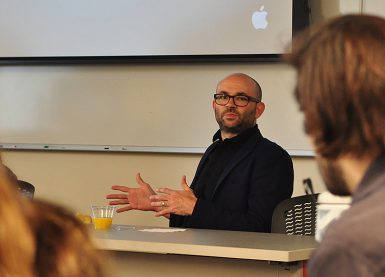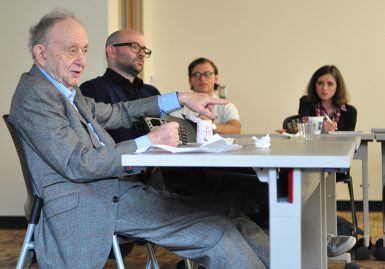Filmmakers discuss performance, editing in master class

Documentary film gives society a chance to view itself through a different lens, according to filmmakers Frederick Wiseman and Robert Greene, who joined students for a master class last week in Franklin Hall.
About 20 undergraduates and graduate students, faculty and invited students attended the master class about documentary filmmaking, a project hosted by IU Cinema director Jon Vickers.
The two were on campus as guests of IU Cinema’s 2017 Filmmaker to Filmmaker: Conversations from the Director’s Chair series. Later in the evening, the two took to the stage at IU Cinema for the conversation, and the cinema showed several of their documentaries in the days leading up to the talk.
In the master class, the small setting allowed the filmmakers to discuss details of their work and the audience to ask questions.
Both are award-winning documentarians. Wiseman most recently won an Academy Honorary Award from the Academy of Motion Picture Arts and Sciences. His work includes more than 40 films, and his subject matter often looks at people functioning in social institutions.
Robert Greene’s films include Kate Play Christine, Actress, Kati With an I and Fake it So Real. His work has been nominated for Gotham Awards and Cinema Eye Honors.
Each discussed the role of behavior change in front of the camera in documentary film. Greene said he thinks a lot of people believe behavior change, often seen as performance in documentary film, is phony, but he doesn’t agree.
“There’s still truth to that performance,” he said. “You can use that performance to pull something out of there that we might not see otherwise.”
Wiseman said he thinks the way people act in front of the camera is subjective because people will always pull different meaning from film.

“People behave in ways they think are acting appropriately for the situation they’re in,” Wiseman said. “Others might not think their behavior is appropriate.”
As a filmmaker, he said he you can make judgments about people based only on what you see and hear.
Ethan Gill is a junior studying cinema and media production. He said documentary filming is important because it gives people a different view of societal problems.
“Wiseman brings the story to life by just letting people talk and showing what they say,” Gill said.
When it does seem like a person is changing behavior because of the camera, Wiseman said he simply uses his judgment. When he sees what he thinks is behavior tailored to the camera’s presence, he can decide to either stop filming or not use that material.
“It’s always relevant to see the behavior of social servants,” said Wiseman. “It’s important to be transparent.”
When he edits, he thinks of the film in two tracks: the literal and the abstract. Without both, he said, a film cannot work. The film needs to show what people are literally doing, while examining the abstract questions like why are they wearing those clothes and why are they moving a certain way. He makes sure he can explain every decision thoroughly to himself.
“Part of the fun of making these films is to analyze human nature,” Wiseman said.
More:

